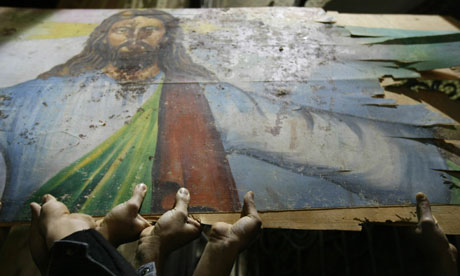From kindergarten Egyptian citizens are branded as Christians or Muslims – a practice that many feel deepens divisions
By M Lynx Qualey
This commentary was published in The Guardian on 24/01/2011

I arrived in Egypt in 2001, having given up my job as a US-based journalist. I wanted to do something away from the world's daily troubles, something practical, and so I took on the task of educating well-heeled kindergarteners in Cairo. This went on for two exhausting years.
In my first week as a teacher, I was given a list of my pupils. Each had a letter in the column beside his or her name, either a C or an M. Nada and Daniel and Sara were Cs. Other students – I believe the rest of them – were Ms.
I didn't pay much attention to this, except perhaps to the novelty of it. Perhaps I assumed that these letters were meant to increase teacher sensitivity around the holidays. I certainly didn't see it as a fundamental division in a country growing more and more divided along criss-crossing fault lines of suburban and urban, Muslim and Christian, private- and government-school educated.
A decade has passed, and my eldest son is now in school with a letter appended to his name. A bomb has gone off at an Alexandria church. People have been shot; one man was allegedly beaten to death during interrogation; others were imprisoned for protesting against the situation. The letter next to a child's name, C or M, has taken on a different dimension.
The letter attached to my eldest son's name is not a U for Undecided nor a B for Buddhist – which is how he currently identifies himself – nor an NOYB, for None of Your Business. It is the C of his Egyptian birth certificate, given him to match his parents' papers. This C follows him around like a fly in search of sugar.
When he began grade one, my son was duly enrolled in deen class, or religion. In this, he was like nearly all his peers across Egypt. But he was also part of a small minority.
Although Egypt's Copts make up an estimated 10% of the country's population, many choose to live in "ghettoes" and attend schools with other Christians.
My son attends a largely Muslim school, which – for most of his days – has made no difference. But, once a week in grade one, he was separated from his friends and sent off to Christianity class with one girl. It was lonely in there. He didn't take to the teacher. And he didn't like being separated from his new best friends, Hussein and Malak.
I saw it as a personal issue. But a friend with a new baby forced me to look beyond this, sighing as she said: "They're separating them already?"
Although the religious-identification issue has most seriously affected the smaller minority groups, such as the Baha'i, a growing number of Egyptians see the listing of religion on national IDs as a stumbling block to just and peaceful coexistence. It leads directly to discrimination against Copts, some say. In the wake of the New Year's Eve church bombing, several human-rights groups have renewed their demand that religion be wiped off IDs.
My eldest son still has a C attached to his name. However, after a series of family discussions, we asked the school to switch him into Islam class. He has changed neither his beliefs nor his paperwork. But we decided that the experience of being excluded wasn't doing him much good, and that in any case he should know about the tenets of Islam.
I don't worry about his religious education, which will be multi-faceted and varied. But I do worry about what we did to the girl who was left alone in Christianity class. I wonder: Does she have any company this year? What does it mean to her, to be separated from her peers and set alone in a room with a teacher? What does it mean to the other children, to see her leave?
Perhaps there is a way to be separate but equal. But a continuation along our current path – separate, not understanding, angry, silenced, unequal – could well tear out the roots of more than a thousand years of sometimes difficult, sometimes peaceful coexistence
No comments:
Post a Comment